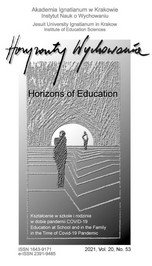The Use of Game Elements in Higher Education in the Context of Motivating Different Types of Users of Gamified Systems
The Use of Game Elements in Higher Education in the Context of Motivating Different Types of Users of Gamified Systems
Author(s): Aleksandra Witoszek-KubickaSubject(s): Higher Education , Psychology of Self, Behaviorism, Methodology and research technology, ICT Information and Communications Technologies
Published by: Uniwersytet Ignatianum w Krakowie
Keywords: gamification; gamification user types; self‑determination theory;
Summary/Abstract: RESEARCH OBJECTIVE: The main purpose of the article is to select the elements of games that increase the student’s external and internal motivation tailored to the specific type of player he/she represents. THE RESEARCH PROBLEM AND METHODS: The research problem is the issue of motivating students using gamification. The author addresses the issue of preparation of classes that will actually translate into motivation to learn practical skills, but also to develop, pose difficult questions and engage in the learning process. The research is based on the Self-Determination Theory and Marczewski gamification users typology. The basic method used in the presented research is an analysis of a questionnaire conducted among students of the Cracow University of Economics. THE PROCESS OF ARGUMENTATION: The article consists of two main parts. The first presents the concept of gamification and its use in motivating. Second part of the article is divided into three subsections. First of them contains characteristics of different participants types in gamification projects. Second of them presents assumption and research hypotheses, the other one includes analysis of the results and conclusions of the study. RESEARCH RESULTS: Thanks to the conducted research and based on the subject literature, the predispositions of students to accept the use of selected mechanisms known from games were determined. The conducted research confirmed the assumed hypothesis that the legitimacy of using particular elements of gamification depends on the target group of participants. However, the hypothesis of ineffectiveness of the use of elements specific to the type of player was not confirmed. CONCLUSIONS, INNOVATIONS, AND RECOMMENDATIONS: Further research is needed to verify this assumption, e.g. using a gamification project. Due to the limited research sample, the results do not reflect the entire population, but provide a basis for further research on the motivational elements of individual participants in gamification systems. They can also be treated as a guideline for the implementation of gamification in the curricula addressed to students in Poland.
Journal: Horyzonty Wychowania
- Issue Year: 19/2020
- Issue No: 51
- Page Range: 57-67
- Page Count: 11
- Language: English

